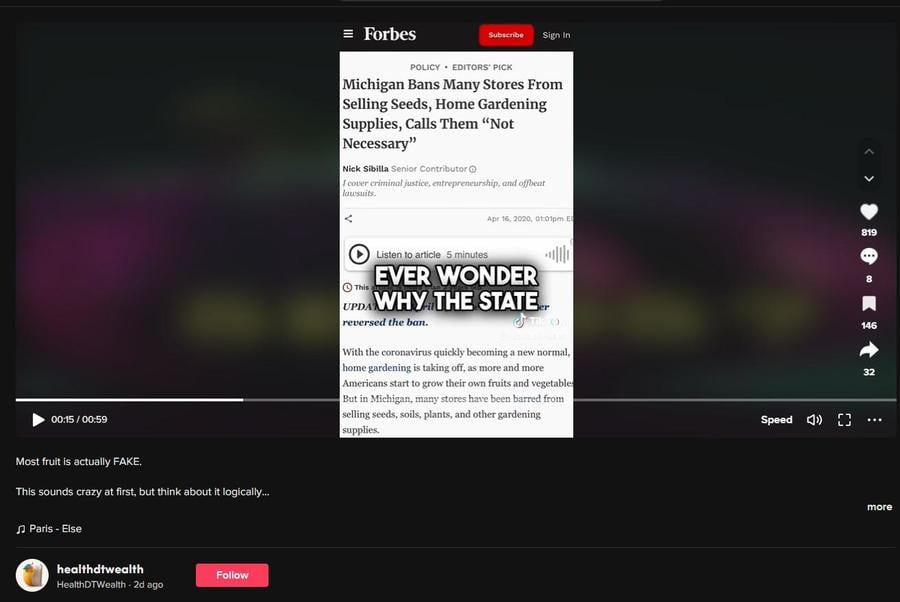
Does the state of Michigan ban most stores from selling seeds, and is the purpose of this ban to force people to only buy fruit from big corporations? No, that's not true: Michigan does not ban seed sales. There was a short period during the early weeks of the coronavirus pandemic when seeds were off limits to customers shopping in large stores, not because seed sales were banned but because some garden centers were closed.
A video (archived here) was posted on TikTok on May 21, 2023, by @healthdtwealth. The post was captioned:
Most fruit is actually FAKE.
This sounds crazy at first, but think about it logically...
This is what the post looked like on TikTok at the time of writing:
(Source: TikTok screenshot taken on Tue May 23 14:52:47 2023 UTC)
The narrative of this video refers to seedless produce as "fake." This fact check will not be addressing that question about seedless produce.
At 14 seconds into the video, without stating it explicitly, the narrator suggests that Michigan's ban on the sale of seeds is ongoing and that this, coupled with seedless produce, is part of a plot to keep people dependent on large corporations for food. The narration says:
Ever wonder why the state of Michigan bans most stores from selling seeds?
While these foods may still have some benefit, you always want to pick the ones with the seeds because the seeds contain the most nutrients and are also capable of reproducing life.
When you take away seeds from the fruit, you take away the ability to regrow fruit and produce more crops. Big corporations hate this and want us only buying fruit from them...
The video includes a screenshot (pictured below) of an April 16, 2020, article in Forbes titled, "Michigan Bans Many Stores From Selling Seeds, Home Gardening Supplies, Calls Them 'Not Necessary.'" At the time this happened there were many headlines misrepresenting what the restriction actually was. Lead Stories published a fact check on April 13, 2020, regarding a false claim that Michigan banned the sale of American flags. The screenshot included in the TikTok video even includes the partly obscured text in the 2020 update of the article on Forbes.com, which says:
UPDATE: On April 24, Governor Whitmer reversed the ban.
(Source: TikTok screenshot taken on Tue May 23 14:52:47 2023 UTC)
Michigan Gov. Gretchen Whitmer issued an executive order (EO), a "Temporary requirement to suspend activities that are not necessary to sustain or protect life". This order was issued on April 9, 2020 and was rescinded on April 24, 2020. Included in the order were regulations closing certain departments in stores larger than 50,000 square feet. Carpet, furniture, paint and garden centers and plant nurseries were the four sections of the stores listed. The purpose of the executive order had nothing to do with limiting home gardening. The text of the order explains the intention "to direct residents to remain at home or in their place of residence to the maximum extent feasible" in order to suppress the spread of COVID-19 and avoid needless deaths.
The April 9, 2020, Executive Order 2020-42 from Whitmer is identified as temporary right in the name of the order: "Temporary requirement to suspend activities that are not necessary to sustain or protect life - RESCINDED." It was rescinded on April 24, 2020, by Executive Order 2020 - 59.
The restrictions from EO 2020-42 did not explicitly ban the sale of seeds or garden plants. It closed specific departments in large stores over 50,000 feet that were still open. "Garden centers and plant nurseries" were one of those departments.
The introduction to EO 2020-42 describes the first cases of COVID-19 in Michigan on March 10, 2020, and the state of emergency that was declared that same day. There is no basis to suggest Whitmer issued these executive orders to prevent people from being able to grow their own vegetable garden. The fifth paragraph of the introduction of EO 2020-42 gives this reason for the restrictions:
To suppress the spread of COVID-19, to prevent the state's health care system from being overwhelmed, to allow time for the production of critical test kits, ventilators, and personal protective equipment ... and to avoid needless deaths, it is reasonable and necessary to direct residents to remain at home or in their place of residence to the maximum extent feasible.



















